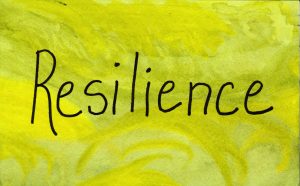Resilience was my November word (12 Words for 2018). You won’t find it on the original list. It snuck in there last month. I just got a strong intuition that Resilience had something to say to me and ask of me, so I bumped Whole-Heartedness, November’s original word, into December.
Here is what Merriam-Webster has to say about “Resilience: An ability to recover from or adjust easily to misfortune or change.” Sign me up!
I would propose that all of us need Resilience, because our lives are in constant flux and change.
And that is what I most learned from a month of focus on Resilience: it isn’t just the big stuff where we need Resilience. We need Resilience in the constant stream of little challenges and changes in our lives.
Perhaps we need Resilience even more for the little stuff than the big stuff in our lives.
I think we all tend to discount the cost of little stresses and challenges and changes in our lives, because we have developed an inner toughness and resourcefulness that has us “toughing it out” and “pushing through it”.
This approach can be useful, of course, but it can also take a toll and wear us down if we are constantly facing little challenges and changes in our lives, and we don’t have a toolkit of strategies with which to nourish and replenish ourselves, physically, emotionally, intellectually, and spiritually.
It doesn’t work if our sole strategy is girding our loins and pushing forward, through it all.
We all experience times in our lives where what is coming our way isn’t expected, or feels disappointing or frustrating.
Here’s an example of what I mean. For me this month, I experienced what felt like one thing after another, all relatively minor, but persistent:
- I had a series of health challenges that showed up, one after another, that kept me on the bench for a few weeks, and this was compounded by some medical re-schedules and new-schedules.
- A blizzard dumped over a foot of snow, nixing my husband’s birthday celebration.
- I needed to postpone a few small work projects that looked, finally, like they could get going in November.
- I had no energy for my usual art projects, much less the new ones. I had to continually let go of starting those too.
None of these things, especially by themselves, are very challenging. But they happened to come in a continuous flow, and it started to feel a bit relentless.
Also, as a result, I felt like I was keeping up with the absolutely essential work commitments, but nothing much else. At the beginning of the month, it had looked like there was a wide expanse of time and space available to begin a few new creative endeavors.
This was the perfect set-up for Resilience.
Yes, we definitely need Resilience for the big challenges and changes in our lives.
But, the little stuff can really wear us down if we are not paying attention. It is erosion, and it can challenge our good spirits and our energy levels.
For me, Resilience is the feeling that my inner well is replenished and full, so that I can handle what comes my way.
About mid-month, this point about the little stuff and Resilience started to sink in, and I kicked my go-to Resilience strategies into high gear. My favorite replenishing and rebalancing strategies are:
- Meditation
- Guided Visualization
- Walking
- Journaling
- Eating Well
- Hydrating
None of this is rocket science, and I do all of it most of the time. But I made the connection that all of it is crucial to my Resilience, and I began to make it my top priority, and to give myself as much of it as I needed, no matter what. I stopped second guessing myself about whether I was being indulgent. I realized that all of it was essential, not optional.
I realized something else about Resilience, too. If we don’t tend to our Resilience on the small stuff, we certainly won’t have it for the big stuff.
Your favorite Resilience strategies will be different. But, it might be handy to be very conscious of what they are, so that you can pull them out whenever you need them. A sort of Resilience Toolkit, customized specifically to meet your needs.
What is Resilience for you? And what are your top Resilience strategies?

Leave a Reply